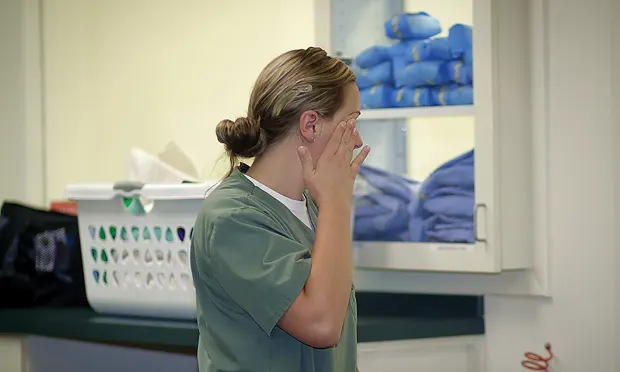
Dear Second Opinion,
I’m having trouble navigating a situation at work. I work at a practice with 3 other doctors and several veterinary technicians. One of the veterinary technicians, although very skilled, is rude to the point of being hostile. When I ask her to help me with a patient, she usually rolls her eyes and makes a comment about me always needing something. When I see a patient for a progress exam and there isn’t improvement, she mutters things like "shocking," if I have failed to provide adequate care. I have even heard her chatting with clients in the exam room following the appointment about how she would recommend that they consult with one of the other doctors next time. I have calmly (and as objectively as I could manage) mentioned this to her several times over the last 6 months and asked her to stop, but she laughs and acts like she doesn't know what I'm talking about.
To make things more complicated, she is a family friend of the practice owner. I have also raised my concerns to the owner and the practice manager (who is the owner’s spouse) and have been told that I’m too sensitive and that the technician is "just joking around."
I know that I should probably look for another job, but I don’t want to let my patients down. I also worry about finding myself in a similar situation in another practice. What should I do?
—Stuck in a Toxic Workplace
Dear Stuck,
It’s normal to want to feel good at what you do and to have the support of those you work with, especially those in positions of leadership. It’s also normal to want a sense of fairness in how your concerns are addressed by those leaders. You are dedicated to your practice and patients and you’d rather not leave, but your coworker’s actions are understandably hurtful.
It sounds like leaving is at least an option? Many veterinary professionals I talk with face barriers such as family constraints or non-compete agreements, making it difficult or impossible to leave. For those who can’t escape stressful work situations, there are strategies and mindsets I recommend for coping. (See Resources)
Unfortunately, in your case I’d give a poor prognosis for meaningful improvement if you stay. You have made good faith efforts to resolve the issue yourself without success. When practice leaders don’t show a willingness to address problem behaviors among team members—and especially when they have personal ties to those team members—if change happens at all, it is challenging and incredibly slow. Since unaddressed conflict is usually contagious, I would bet the situation is likely to get worse instead of better.
There is a toxic behavior problem in our profession, but it is NOT universal.
The cost of staying in a difficult workplace is not insignificant. You likely already feel some of the impact this work environment is having on your mental and physical wellbeing.1-5 Plus, studies suggest that incivility also impacts patient care.6 You’re dedicated to caring for patients, and can serve them better in a more positive work environment.
Your best bet is looking for a new position. Fortunately, not all practices are like the one you are at now. Studies suggest that in a given year, 68% of veterinary professionals neither witness nor experience workplace abuse, not even the social exclusion of other team members.7 There is a toxic behavior problem in our profession, but it is not universal.
How can you avoid ending up in a similarly toxic practice again? Interview potential employers.
Behavioral Interviewing
Interviewers often use a strategy called "behavioral interviewing" that helps them use an employee’s past behavior to predict future behavior. You can use this same approach to interview practices.
Ask potential practices about a time a team member engaged in rude or disrespectful behavior and/or about a time where there was a personal relationship between a practice leader and another employee.
What happened?
How did they respond?
How did the situation turn out?
Ask the practice you are interviewing for references, and take advantage of the fact that veterinary medicine is a small world. Odds are you know someone who knows someone who has worked there. Ask past employees those same questions about how the practice has addressed personal relationships or rude behavior in the past.
As you suspected, looking for another job with a more positive culture is likely your best bet. It is both possible and probable in the current veterinary job market to find what you’re looking for somewhere else. I wish you a happier, healthier work environment going forward.
Sincerely,
Cyndie Courtney, DVM, The Jerk Researcher